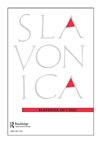Celebrating the Centenary: The History of the Founding of the Russian Lectureship at the University of Glasgow
IF 0.1
0 HUMANITIES, MULTIDISCIPLINARY
引用次数: 0
Abstract
It is safe to say that the lectureship in Russian at the University of Glasgow could not have been established without the extraordinary support given to the Faculty of Modern Languages by Principal Donald MacAlister (1854–1934). Principal MacAlister, a selflearner of Russian, not only partially financed, but also actively encouraged the establishment of what is one of the oldest Russian lectureships in the U.K. Though many would associate the establishment of the lectureship solely with the significant financial gift of William Weir to the university, the role of Principal MacAlister gained a new significance during the explorations carried out by Glasgow University’s Russian students in the University Archives. While some information on the relations between the University of Glasgow and Russian institutions is available, there is still a lot of exploration to be done into the intricacies of this relationship and the main figures who shaped the lectureship. Under the auspices of the Chancellor’s Fund and the Russian department, we, students of Russian in the School of Modern Languages and Cultures of Glasgow University, were able to uncover remarkable detail about how Russian at the University of Glasgow truly came about. The primary purpose of the Russian lectureship appears to have been of a much more prosaic, commercial nature than that of a romantic endeavour to master the likes of Tolstoy and Dostoyevsky in the original. Not only did Principal MacAlister and Lady MacAlister tender a sum of around £14,000 to the University and by extension to the modern languages, but he also singlehandedly wrote the ‘Memorandum containing suggestions for the promotion in Glasgow of closer relations with Russia’, dated September 1916. In the Memorandum, the primary goals of the lectureship were outlined, and very quickly it became apparent that the lectureship was not only meant to provide ‘instruction in the Russian language’ but also to promote trade relations with a specific focus on training Russian-speaking commerce graduates. Within the Memorandum, good relations with the Glasgow Commercial College were emphasized as paramount. The lecturer-to-be was specifically instructed to arrange, ‘with the help of a qualified colleague’, evening Russian courses focused on reading, writing, speaking, commercial correspondence and economics of Russian trade. These courses were specifically to be adapted to those students already in business and to those aspiring to be ultimately employed by Russian firms requiring British employees. The urgency to boost trade relations and the economy between the two countries is palpable in MacAlister’s use of language. MacAlister envisioned a ‘bureau or office, under the auspices of the Chamber of Commerce and the Merchant’s House’ to be established as a part of the same endeavour, to facilitate the庆祝百年:格拉斯哥大学俄语讲师的建立历史
可以肯定地说,如果没有唐纳德·麦卡利斯特校长(1854-1934)对现代语言学院的大力支持,格拉斯哥大学的俄语讲师职位是不可能建立起来的。MacAlister校长自学俄语,不仅部分资助,而且积极鼓励建立英国最古老的俄语讲师职位之一。尽管许多人将讲师职位的建立仅仅与William Weir对大学的重大财政捐赠联系在一起,但在格拉斯哥大学俄罗斯学生对大学档案进行的探索中,MacAlister校长的角色获得了新的意义。虽然关于格拉斯哥大学和俄罗斯机构之间关系的一些信息是可用的,但对于这种关系的复杂性和形成讲师地位的主要人物,仍有很多探索要做。在校长基金和俄语系的支持下,我们这些格拉斯哥大学现代语言与文化学院俄语专业的学生,得以揭开格拉斯哥大学俄语课程真正起源的重要细节。俄罗斯讲师的主要目的似乎更平淡无奇,更具有商业性质,而不是试图在原著中掌握托尔斯泰和陀思妥耶夫斯基等人的浪漫主义。麦克阿利斯特校长和夫人不仅为格拉斯哥大学提供了大约14000英镑的资金,并扩展到现代语言,而且他还独自撰写了1916年9月的“关于在格拉斯哥促进与俄罗斯更密切关系的建议备忘录”。在备忘录中,概述了讲师的主要目标,很快就发现讲师不仅要提供“俄语教学”,而且要促进贸易关系,特别注重培训讲俄语的商业毕业生。在备忘录中,与格拉斯哥商学院的良好关系被强调为最重要的。这位未来的讲师被特别指示,“在一位合格同事的帮助下”安排晚间俄语课程,重点是阅读、写作、口语、商业通信和俄罗斯贸易经济学。这些课程是专门为那些已经经商的学生和那些渴望最终受雇于需要英国雇员的俄罗斯公司的学生量身定做的。促进两国贸易关系和经济发展的紧迫性在麦克阿利斯特的语言使用中显而易见。麦克阿利斯特设想,作为同一努力的一部分,“在商会和商人协会的主持下,建立一个局或办公室”,以促进贸易
本文章由计算机程序翻译,如有差异,请以英文原文为准。
求助全文
约1分钟内获得全文
求助全文

 求助内容:
求助内容: 应助结果提醒方式:
应助结果提醒方式:


